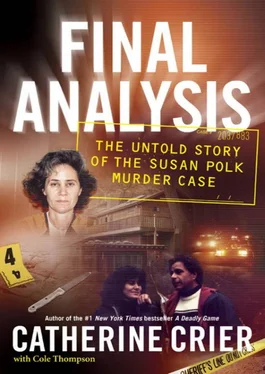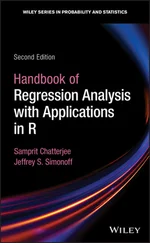“He was essentially living out of his car, but sleeping at the house,” Dan Briner said of Eli’s brief stay. “He had his girlfriend downstairs. We were trying to help him. The plan was to send him out to a school in Colorado that would take him. He liked rugby and we thought that the estate would cover the tickets.
“His Aunt Evelyn helped with the planning,” Dan said of Felix’s older sister, who had gone on to become a concert pianist. She was also one of Eli’s biggest supporters, offering to help in any way she could, but there didn’t seem to be anything that Evelyn could do.
“It was all set up and then Susan called [Eli] and said ‘It’s a trap, they’re manipulating you.’ Then, just like that, it stopped,” Dan Briner said. “Then there was this falling out with Marjorie and I asked him [Eli] to leave because he wasn’t following directions. Once you put any pressure on Eli, Susan just goes off.”
After the situation at the Briners eroded, Eli moved to Los Angeles to live in the university frat house with Adam, but that arrangement, too, quickly turned unmanageable. Susan grew furious when she learned that Eli was burning through his trust fund, spending in excess of twenty thousand dollars in just a few months on food and entertainment. Eli explained that he had no choice: he had to eat out because the frat house had no kitchen.
Eventually, Eli ended up back at the Orinda house. He was living there only a short time when he was arrested and charged with reckless driving after leading police on a high-speed chase, reaching speeds as high as 130 mph on Interstate 680.
It was around midnight on October 14, 2003—the one-year anniversary of Felix’s death—that a sheriff’s deputy from the City of San Ramon Police Department initially spotted Eli’s Camaro passing by with expired registration tags. After radioing his dispatcher, Sheriff’s Deputy Mark Johnson flicked on his red and blue police lights to make a traffic stop, causing the Camaro to accelerate to speeds of between 40 to 50 mph in the 35 mph zone. Johnson turned on his siren and sped after the Camaro.
As the car approached I-680, Johnson watched it fishtail before entering the highway. Flooring his accelerator, the trooper muttered under his breath as the Camaro pulled away. At one point, he glanced down at his odometer and noted that he was traveling at 130 mph—twice the legal limit—and quickly terminated the pursuit because of the danger to himself and other motorists.
He watched in frustration as the Camaro sped off, weaving through traffic before exiting the Interstate on Bollinger Canyon Road, where a second trooper, Deputy Sheriff Jeffrey Schraeder, picked up the chase. Shraeder observed the Camaro skid sideways with tires screeching across three lanes of traffic before its driver regained control of the vehicle. Seconds later, he saw the car turn off the road into an empty parking lot and come to a stop, its engine smoking and right front tire flat. Shraeder followed the Camaro into the darkened lot, with Trooper Johnson pulling in a short time later to make the arrest.
Striding to the car, Johnson observed that the driver had “red eyes” and “smelled strongly of marijuana.” He demanded that Eli open his mouth and stick out his tongue. Using a flashlight, Johnson observed that the back of Eli’s mouth was “green,” suggesting he had swallowed some marijuana. Eli was arrested and charged with reckless evasion of a police officer and several other traffic infractions. During cross-examination at his trial, he later admitted that he had a bag of marijuana in his possession and had smoked marijuana earlier that day.
In the end, Eli was found guilty of reckless endangerment of a police officer and in February of 2005 was placed on three years probation, conditioned on ninety days in the county jail or electronic home monitoring.
Susan, meanwhile, was behind bars in August of 2003 when a Grand Jury was convened to determine whether to indict her on charges of first-degree murder. Panelists heard from police officers, investigators, and forensic experts during three closed-door sessions. One criminalist testified that hairs found in Felix’s clenched fist were “consistent” with those of his wife, Susan, and that several of the hairs had roots, indicating they had been ripped from her scalp, probably during a violent struggle. Meanwhile, another forensic expert presented evidence that a bloody footprint found near the body was a match to Susan’s right foot.
“I think there seems to be a reasonable conference [agreement] here that the crime was committed, that there was some clean-up within the pool house bathroom, and that for whatever reason, Susan Polk came around the back side of the crime scene, perhaps Felix was still struggling, and then exits the house,” the expert told the Grand Jurors. “I make that argument because of the evidence at the scene, as well as that pool house bathroom, the towels on the ground that are bloody, the blood on the counter, and for the simple fact, no bloody shoes are found, no bloody female clothing is recovered.”
With regard to the lack of injuries found on Susan’s body, ADA Tom O’Connor pointed to the testimony of Brian Peterson, the medical examiner who performed the autopsy on Felix Polk.
“It wouldn’t be unusual that the attacker in this situation wouldn’t have significant injuries,” Dr. Peterson told jurors.
In late August, the panel indicted Susan Polk on charges of first-degree murder in the stabbing death of her husband.
Eli was furious when he learned that the judge presiding over the case of the People v. Susan Mae Polk continued his mother’s no bail status, and in January 2004 he sent a letter to the court objecting to the ruling.
“What has happened to my mom is unbelievable,” the teen wrote in a letter, dated January 27, to the judge presiding over his mother’s case:
My mom has been charged with a crime she didn’t commit. And now she has been unjustly incarcerated for over 15 months with no sign of the court’s undoing the injustice that has been done.
From what I see, the prosecutor’s theory of what occurred is impossible. I know without question that if there were a physical struggle between my mom and dad, my father would be the instigator, as he always was….
As I began to grow in my mind and body, I consciously and unconsciously searched for ways to figure out who was telling the truth and who was telling lies…. I studied everything about both my mom and my dad… to seek what a normal kid my age could never even begin to imagine…. My father’s façade was well created… and if you’re around it long enough… you start to break through it as you mature. So when I was roughly around the age of 15, I finally began to no longer see the poor, weak, aging man who was losing his family to a crazy, troubled wife.
If there was one thing my dad had never acted like, it was weak. My father definitely wasn’t weak when he was beating me up or slapping my mom. He never acted powerless when he used to take my two brothers and I into the office, one at a time, and hypnotize us.
One of the few documents to provide a window into Eli’s thoughts, the letter demonstrated the close connection between Eli and his mother. In the months ahead, Eli remained the only son to defend her account of his father’s death. To many, his vows of support bordered on obsessive, and there was speculation that Eli and Susan’s relationship was odd. Not only was Eli taking her side, but often he even used the same language that she did, and his letters to her were filled with professions of undying love—even expressing his willingness to take his own life for her. “I love you enough to burn all I am and meet you in the after life,” he wrote to Susan while she was incarcerated at the West County Detention Facility. There was also speculation among members of the media that Eli and Susan could have entered into a suicide pact—in the event that Susan was sentenced to life in prison for Felix’s murder, the two would kill themselves.
Читать дальше











